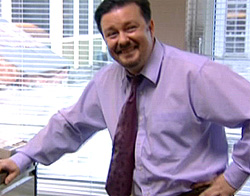June 27, 2005
TV ON DVDThe Office
My friend Ashley stopped by a couple of weeks ago and plopped down on my couch during the middle of my bimonthly West Wing marathon. We watched for a few minutes and she wrinkled her nose, which I, of course, took as a personal affront.
"You don't like it?" I asked.
"They don't talk like real people," she replied.
Well, duh. The West Wing isn't CSI: Miami or Law & Order: Special Victims Unit. Aaron Sorkin, much like fellow TV auteur Joss Whedon, at his best doesn't write like people talk. He writes, if not poetry, then at least poetically.
What, you may ask, does this have to do with The Office? Good question.
| The Office speaks like normal people; like such vividly normal, such aggressively average people, it attains a poetry all its own. A poetry of murmurs and asides, of pauses that last too long and jokes that make no one laugh. |
It's also really funny.
The Office, for the three people who don't know, is the brainchild of Ricky Gervais and Stephen Merchant, two low-level functionaries at the BBC who stumbled into making the funniest sitcom of the last five years.
(And, to digress, if you've already seen The Office and are on the fence about purchasing the DVDs, please know that the Gervais-Merchant documentaries are worth the price by themselves — they work together well and mesh completely, meaning their ideas meld flawlessly. As they speak together its like listening to one demented, albeit brilliant, person; I am nominating them for the Nobel Prize for Chemistry.)
The show takes place in Slough (pronounced "slau"), in the offices of Wernham Hogg Paper, and centers around the antics of David Brent (Ricky Gervais), the branch manager and insufferable boor. Surrounding him are the likes of weasely second-in-command Gareth Keenan (Mackenzie Crook) and affable everyman Tim (Martin Freeman), who is hopelessly in love with sweet receptionist Dawn (Lucy Davis). The storyline focuses on the fear that the Slough branch of Wernham Hogg will be folded into the Swindon branch, a move that would essentially cost everyone their jobs. It sounds like the recipe for yet another workplace sitcom, a la News Radio or Ink.
It is. Kind of.
The Office makes its mark by tweaking the traditional workplace sitcom formula: it is told not in standard three-camera format, but in faux-documentary style. It was never designed to be a long-running show, but a story with a definite beginning, middle, and end, in two six-episode "seasons," nicely polished off by a Christmas special at the end. The jokes, while funny, were never meant to be the focus of the show (as I mentioned before, not all of them were even meant to be funny).
Let's start with the good and move on to the better. Or vice-versa. Either way.
 "People see me, and they see the suit, and they go: "you're not fooling anyone", they know I'm rock and roll through and through. But you know that old thing, live fast, die young? Not my way. Live fast, sure, live too bloody fast sometimes, but die young? Die old." |
Television characters, by their episodic nature, are composed of tiny moments. Great characters create moments that are never forgotten, and David Brent is no exception. There are too many to name and they occur too frequently. I tried listing my favorites on a piece of paper and it was quickly covered in ink. He is something that must be seen.
The Office is many things. It is a brilliant character study, a show that lets outsized personalities collide and carom off each other. It is the last refuge of awkwardness on television, the only sitcom I've ever seen that lets bad jokes hang in the air for what seems an unbearable length of time, and allows its characters to be completely dejected and humiliated. It is, finally, the sweetest of love stories — Tim and Dawn are so perfectly matched, so obviously enamored of each other, that every glance becomes a love letter and every touch a stolen kiss. It's "Romeo and Juliet" on a smaller scale.
And this, finally, is what makes The Office so special — that under the veneer of boorishness or obnoxiousness or stupidity, each character tries so hard to be their best. Gareth is, in the words of a co-worker, a "weasel-faced ass," but he's the most diligent and thorough of employees. Tim may tease Gareth mercilessly, but the show isn't afraid to show the genuine affection each has for the other. David may be a buffoon, but he never acts out of spite or malice; he genuinely wants everyone to have a good time.
Oh, and they're all really funny.
Email the author.
All written content © 2005 by the authors. For more information, contact homer@smrt-tv.com
